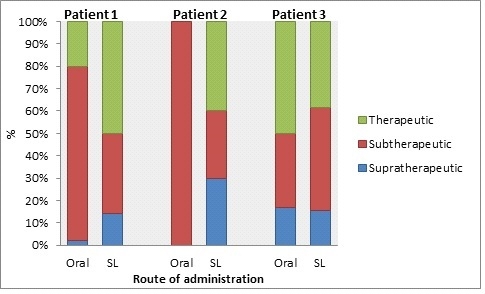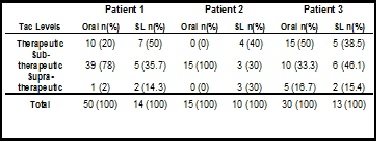Sublingual Tacrolimus in Liver Transplantation: A Valid Option?
1Division of Transplantation Surgery, Mayo Clinic, Rochester, MN
2Department of Pharmacy, Mayo Clinic, Rochester, MN.
Meeting: 2016 American Transplant Congress
Abstract number: D174
Keywords: Immunosuppression, Liver transplantation
Session Information
Session Name: Poster Session D: Liver: Immunosuppression and Rejection
Session Type: Poster Session
Date: Tuesday, June 14, 2016
Session Time: 6:00pm-7:00pm
 Presentation Time: 6:00pm-7:00pm
Presentation Time: 6:00pm-7:00pm
Location: Halls C&D
Introduction. Oral tacrolimus (Tac) is currently the pilar of maintenance immunosuppression following solid organ transplantation and the most common route of drug delivery. Recent studies proposed sublingual (SL) administration as an alternative. Data regarding its use in adult liver transplant (LT) recipients is limited. In this report, we documented our experience with SL Tac in LT recipients.
Methods. Patients (n=3) who underwent LT between 8/13 and 8/15 were included. Two (Patients 1 and 2) were transitioned from oral to SL Tac due to persistently erratic serum concentrations, and one (patient 3) for severe intolerance to oral intake. SL Tac was started in a 1:2 dose conversion rate (2 mg of oral Tac = 1 mg SL Tac). Tac trough levels (oral and SL) were perfomed 60 minutes prior the morning dose.
Results. All patients tolerated the SL Tac well without any side effects or complications requiring dose reductions or drug discontinuation. In Patients 1 and 2, the therapeutic trough concentration improved significantly after switching to SL Tac: from 20% (10/50) on oral Tac vs 50% (7/14) on SL Tac in Patient 1 (P=0.04), and from 0% (0/15) oral Tac vs 40% (4/10) on SL Tac in Patient 2 (P=0.02). Patient 2, who had consistently subtherapeutic trough levels on oral Tac (mean trough of 2.6 ± 0.7 ng/ml), achieved a stable thereputic level on SL Tac (mean trough 8.1 ± 2.7 ng/ml; P<0.001). In patients 1 and 3, the mean trough levels remained unchanged: 5.1 ± 1.9 ng/ml on oral Tac vs 5.3 ± 1.6 ng/ml on SL Tac (P=0.76), and 4.3 ± 1.3 ng/ml on oral Tac vs 4.2 ± 1.9 ng/ml on SL Tac(P=0.76), respectively. 

Conclusions.Oral administration of Tac is the goldstandard route for drug delivery; however SL administration should be considered as a safe alternative when the oral method is not an option.
CITATION INFORMATION: Moreno Gonzales M, Myhre L, Taner T. Sublingual Tacrolimus in Liver Transplantation: A Valid Option? Am J Transplant. 2016;16 (suppl 3).
To cite this abstract in AMA style:
Gonzales MMoreno, Myhre L, Taner T. Sublingual Tacrolimus in Liver Transplantation: A Valid Option? [abstract]. Am J Transplant. 2016; 16 (suppl 3). https://atcmeetingabstracts.com/abstract/sublingual-tacrolimus-in-liver-transplantation-a-valid-option/. Accessed July 18, 2025.« Back to 2016 American Transplant Congress
